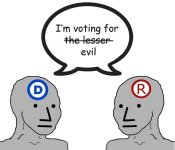They had been previously confirmed like Hur was an AAG, Mueller was appointed by a Dem congress, Smith was never an AAG or ever approved by congress. A special council has to be accountable to someone with a set of rules to follow and a budget to work from, otherwise he would be the most powerful person in the USA.Funny how you say if he was approved by congress that'd somehow mean he'd be independent.
Wouldn't that make him JUST as beholden to Congress?
What about previous DOJ Special Counsels? Or do those not matter because they were before now and suddenly, because it's Trump, the law is magically "not being followed"? That those DOJ's weren't "biased" but now, suddenly, they are?
Election 2024
- Thread starter Tecumsehsbones
- Start date
You are using an out of date browser. It may not display this or other websites correctly.
You should upgrade or use an alternative browser.
You should upgrade or use an alternative browser.
They had been previously confirmed like Hur was an AAG, Mueller was appointed by a Dem congress, Smith was never an AAG or ever approved by congress. A special council has to be accountable to someone with a set of rules to follow and a budget to work from, otherwise he would be the most powerful person in the USA.
Except they don't have to be an AAG or even approved by congress.
Special counsel - Wikipedia
Initiating a special counsel investigation
The decision to appoint a special counsel rests with the attorney general (or acting attorney general). The current special counsel regulations specify that:[6]The Attorney General, or in cases in which the Attorney General is recused, the Acting Attorney General, will appoint a Special Counsel when he or she determines that criminal investigation of a person or matter is warranted and—
- (a) That investigation or prosecution of that person or matter by a United States Attorney's Office or litigating Division of the Department of Justice would present a conflict of interest for the Department or other extraordinary circumstances; and
- (b) That under the circumstances, it would be in the public interest to appoint an outside Special Counsel to assume responsibility for the matter.
The attorney general sets the subject jurisdiction of the special counsel:
The jurisdiction of a Special Counsel shall be established by the Attorney General. The Special Counsel will be provided with a specific factual statement of the matter to be investigated. The jurisdiction of a Special Counsel shall also include the authority to investigate and prosecute federal crimes committed in the course of, and with intent to interfere with, the Special Counsel's investigation, such as perjury, obstruction of justice, destruction of evidence, and intimidation of witnesses; and to conduct appeals arising out of the matter being investigated and/or prosecuted.
The choice of whom to appoint is to be made by the attorney general with the following guidelines:
An individual named as Special Counsel shall be a lawyer with a reputation for integrity and impartial decisionmaking, and with appropriate experience to ensure both that the investigation will be conducted ably, expeditiously and thoroughly, and that investigative and prosecutorial decisions will be supported by an informed understanding of the criminal law and Department of Justice policies. The Special Counsel shall be selected from outside the United States Government. Special Counsels shall agree that their responsibilities as Special Counsel shall take first precedence in their professional lives, and that it may be necessary to devote their full time to the investigation, depending on its complexity and the stage of the investigation.
The origins of special counsels, their powers and what to expect in the Hunter Biden probe
The appointment of a special counsel to oversee the Justice Department’s probe of Hunter Biden is bringing renewed attention on the role such prosecutors have played in history.
On Friday, Attorney General Merrick Garland tapped David Weiss, the U.S. attorney in Delaware who has been probing the financial and business dealings of the president’s son, to oversee the department’s investigation. He said Weiss asked to be appointed to the position and told him that “in his judgment, his investigation has reached a stage at which he should continue his work,” now as special counsel.
In January, Garland appointed Robert Hur, a former U.S. attorney in Maryland, to oversee the department’s investigation into how several batches of documents marked as classified ended up at Joe Biden’s Delaware home and at the offices of the president’s Washington think tank.
And last year, Garland appointed former Justice Department public corruption prosecutor Jack Smith to lead investigations into the retention of classified documents at former President Donald Trump’s Florida estate, Mar-a-Lago, as well as key aspects of a separate probe involving the Jan. 6, 2021, insurrection and efforts to undo the 2020 election. Trump is now facing charges in both cases.
WHAT EXACTLY IS A SPECIAL COUNSEL?
A special counsel is an attorney appointed to investigate, and possibly prosecute, a case in which the Justice Department perceives itself as having a conflict or where it’s deemed to be in the public interest to have someone outside the government come in and take responsibility for a matter.
According to the Code of Federal Regulations, a special counsel must have “a reputation for integrity and impartial decisionmaking,” as well as “an informed understanding of the criminal law and Department of Justice policies.”
Though they’re not subject to the day-to-day supervision of the Justice Department, special counsels must still comply with department regulations, policies and procedures. They also technically report to the attorney general — the one government official who can fire them.
The attorney general is entitled to seek explanations from a special counsel about any requested investigative or prosecutorial step, but under the regulations is also expected to give great weight to the special counsel’s views. In the event the attorney general rejects a move the special counsel wants to make, the Justice Department is to notify Congress at the end of the investigation.
ETA:

Special Counsel Q&A - FactCheck.org
On May 17, the Justice Department announced the appointment of former FBI Director Robert S. Mueller III as special counsel to investigate any possible collusion between the Trump campaign and the Russian government's efforts to influence the 2016 presidential election.
"According to the Lawfare blog, this is only the second time a “special counsel” has been appointed under this specific regulation. The first was in 1999 when Attorney General Janet Reno appointed former Sen. John Danforth to lead an investigation into the federal law enforcement raid of the Branch Davidian compound in Waco, Texas. But as Lawfare explained, past attorneys general have used “different authorities to appoint other special counsels — like Nora Dannehy, appointed in 2008 to investigate the firing of U.S. Attorneys, Patrick Fitzgerald, tasked with leading the investigation into the Valerie Plame affair, and John Durham, who investigated the alleged abuse of suspected terrorists by CIA interrogators.” Those are wholly different from “independent counsels” such as Kenneth Starr, who investigated the Whitewater scandal during Bill Clinton’s presidency. Starr’s investigations were carried out under the Ethics in Government Act, which was enacted in 1978 after the Watergate scandal. But that law expired in 1999.
Lawfare and a Congressional Research Service report go into some detail about the differences between the variations of special counsels, independent counsels and special prosecutors over the years. But Banks said they all have the same core function: to investigate and prosecute possible violations of criminal law by officials of the federal government. And they have been all too common in American history."
Last edited:
So they work for the Garland then? Did you notice your examples until Smith was confirmed by congressExcept they don't have to be an AAG or even approved by congress.
Special counsel - Wikipedia
en.wikipedia.org
Initiating a special counsel investigation
The decision to appoint a special counsel rests with the attorney general (or acting attorney general). The current special counsel regulations specify that:[6]
The attorney general sets the subject jurisdiction of the special counsel:
The choice of whom to appoint is to be made by the attorney general with the following guidelines:

The origins of special counsels, their powers and what to expect in the Hunter Biden probe
The appointment of a special counsel to oversee the Justice Department’s probe of Hunter Biden is bringing renewed attention on the role such prosecutors have played in history.apnews.com
On Friday, Attorney General Merrick Garland tapped David Weiss, the U.S. attorney in Delaware who has been probing the financial and business dealings of the president’s son, to oversee the department’s investigation. He said Weiss asked to be appointed to the position and told him that “in his judgment, his investigation has reached a stage at which he should continue his work,” now as special counsel.
In January, Garland appointed Robert Hur, a former U.S. attorney in Maryland, to oversee the department’s investigation into how several batches of documents marked as classified ended up at Joe Biden’s Delaware home and at the offices of the president’s Washington think tank.
And last year, Garland appointed former Justice Department public corruption prosecutor Jack Smith to lead investigations into the retention of classified documents at former President Donald Trump’s Florida estate, Mar-a-Lago, as well as key aspects of a separate probe involving the Jan. 6, 2021, insurrection and efforts to undo the 2020 election. Trump is now facing charges in both cases.
WHAT EXACTLY IS A SPECIAL COUNSEL?
A special counsel is an attorney appointed to investigate, and possibly prosecute, a case in which the Justice Department perceives itself as having a conflict or where it’s deemed to be in the public interest to have someone outside the government come in and take responsibility for a matter.
According to the Code of Federal Regulations, a special counsel must have “a reputation for integrity and impartial decisionmaking,” as well as “an informed understanding of the criminal law and Department of Justice policies.”
Though they’re not subject to the day-to-day supervision of the Justice Department, special counsels must still comply with department regulations, policies and procedures. They also technically report to the attorney general — the one government official who can fire them.
The attorney general is entitled to seek explanations from a special counsel about any requested investigative or prosecutorial step, but under the regulations is also expected to give great weight to the special counsel’s views. In the event the attorney general rejects a move the special counsel wants to make, the Justice Department is to notify Congress at the end of the investigation.
So they work for the Garland then? Did you notice your examples until Smith was confirmed by congress
Technically, yes. But they are still considered independent.
And again, there's nowhere that says they have to be approved by Congress.
Yes there is a way to tell it's in their title all US attorneys like the AG and Fed. Judges have to be voted on by the Senate to be confirmedTechnically, yes. But they are still considered independent.
And again, there's nowhere that says they have to be approved by Congress.
Yes there is a way to tell it's in their title all US attorneys like the AG and Fed. Judges have to be voted on by the Senate to be confirmed
Great, and because Smith was a US State attorney, you are giving up your objection of him. Good to know.
He was not FederalGreat, and because Smith was a US State attorney, you are giving up your objection of him. Good to know.
Do none of the above is not an option?
It would have saved Cuban from a lot of embarrassmentDo none of the above is not an option?
I think in general, asking a boy who they want to grow up to be like as an adult, most would pick the man. So the poll comes down to how many kids they asked were boys?
He was not Federal
... perhaps look up what happens with US State attorney's?
You should take your own advice State attorneys are either elected or affirmed by the state's senate and cannot work on federal cases... perhaps look up what happens with US State attorney's?
The wheels of lawfare are coming off
Tell GeorgeCases don't get dismissed on appeal.
Last edited:



